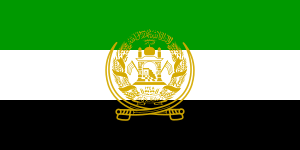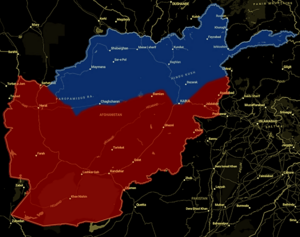Northern Alliance facts for kids
Quick facts for kids United Islamic National Front for the Salvation of Afghanistan |
|
|---|---|
|
Top: The Flag flown by the United Islamic Front
Bottom: Maximum territorial control of the Northern Alliance (blue) against that of the Taliban (red) in Afghanistan in 1996 |
|
| Leaders | Burhanuddin Rabbani Ahmad Shah Massoud Mohammed Fahim Atiqullah Baryalai Abdul Rashid Dostum Abdullah Abdullah Haji Abdul Qadeer Muhammad Mohaqiq Karim Khalili |
| Dates of operation | January 1992 – December 2001 |
| Headquarters | Taloqan, Afghanistan (until September 2000) Fayzabad, Afghanistan (September 2000–November 2001) |
| Active regions | Afghanistan |
| Ideology | Anti-Taliban Anti-Al-Qaeda Islamic democracy |
| Size | 80,000 (1997), 50,000 (2001) |
| Part of | |
| Allies | State allies:
Non-state allies: |
| Opponents | State opponents:
Non-state opponents: |
The Northern Alliance was a group of different military forces in Afghanistan. Its official name was the United Islamic National Front for the Salvation of Afghanistan. This alliance was active from early 1992 until December 2001.
The Northern Alliance was formed after the Soviet Union left Afghanistan. At first, it fought against the government of Mohammad Najibullah. Later, it became the main group fighting against the Taliban regime. The Taliban took control of much of Afghanistan in 1996.
Many countries supported the Northern Alliance, including India, Iran, Russia, and the United States. The Taliban, on the other hand, received support from the Pakistan Army. By 2001, the Northern Alliance controlled only a small part of Afghanistan. This area was mostly in the northeast.
When the U.S. invaded Afghanistan in 2001, they worked with the Northern Alliance. Together, they fought against the Taliban. They won this war by December 2001. After the Taliban were defeated, the Northern Alliance was no longer needed. Its members then helped form a new government in Afghanistan.
In 2021, when the Taliban took control of Afghanistan again, some former Northern Alliance leaders formed a new group. This new group is called the National Resistance Front of Afghanistan.
Contents
Who Led the Northern Alliance?
The United Front was created in late 1996. It brought together different groups that were against the Taliban government. Ahmad Shah Massoud became the main leader. He was very important in defending the alliance's territory. He also decided on the group's overall plans and military actions.
Some parts of the United Front's military were not directly controlled by Massoud. These groups had their own leaders. They were often based on different ethnic groups or regions.
Key Commanders and Groups
The military leaders of the United Front were either independent or part of specific political parties. Here are some of the main groups:
- The Jamiat-e Islami and Shura-e Nazar: These groups were mostly made up of Sunni Tajiks. They were led by Burhanuddin Rabbani and Ahmad Shah Massoud.
- The Hezb-e Wahdat: This group was mainly Shia Hazaras. Their leaders were Muhammad Mohaqiq and Karim Khalili.
- The Junbish-i Milli: This group included Sunni Uzbeks and Turkmens. It was led by Abdul Rashid Dostum.
- The Eastern Shura: This group was mostly Sunni Pashtuns. It was led by Haji Abdul Qadeer.
- The Harakat-e Islami: This group included Shia Tajiks and Hazaras. It was led by Asif Mohseni and Sayed Mohammad Ali Jawid.
Many important military commanders were part of the United Front. They came from different parts of Afghanistan. These commanders included:
- From northern Afghanistan: Bismillah Khan Mohammadi, Atta Muhammad Nur, General Atiqullah Baryalai, Mohammed Fahim, and Abdul Rashid Dostum.
- From eastern Afghanistan: Haji Abdul Qadeer and Hazrat Ali.
- From western Afghanistan: Ismail Khan.
- From central Afghanistan: Karim Khalili.
Two important politicians in Afghanistan later worked with the United Front. They both ran for president in 2009:
- Abdullah Abdullah: He was a close friend of Ahmad Shah Massoud. He also served as the foreign minister for the alliance.
- Hamid Karzai: His father was killed by the Taliban. He worked to get support for Massoud in Europe and the U.S.
Where Was the Northern Alliance Based?
The city of Mazar-i-Sharif was an early headquarters for the Northern Alliance. This was when it was under the control of Abdul Rashid Dostum. However, the Taliban took over the city in 1997.
Later, Taloqan in Takhar Province became the main headquarters. This city was north of Panjshir. The Taliban captured Taloqan on September 5, 2000. After that, the alliance moved its base to Badakhshan Province.
Ahmad Shah Massoud also had a home in Dushanbe, Tajikistan. He met with international diplomats there. These diplomats supported the Northern Alliance.
See Also
- War in Afghanistan (1996–2001)
- War in Afghanistan (2001–2021)
- National Resistance Front of Afghanistan
 | Precious Adams |
 | Lauren Anderson |
 | Janet Collins |



